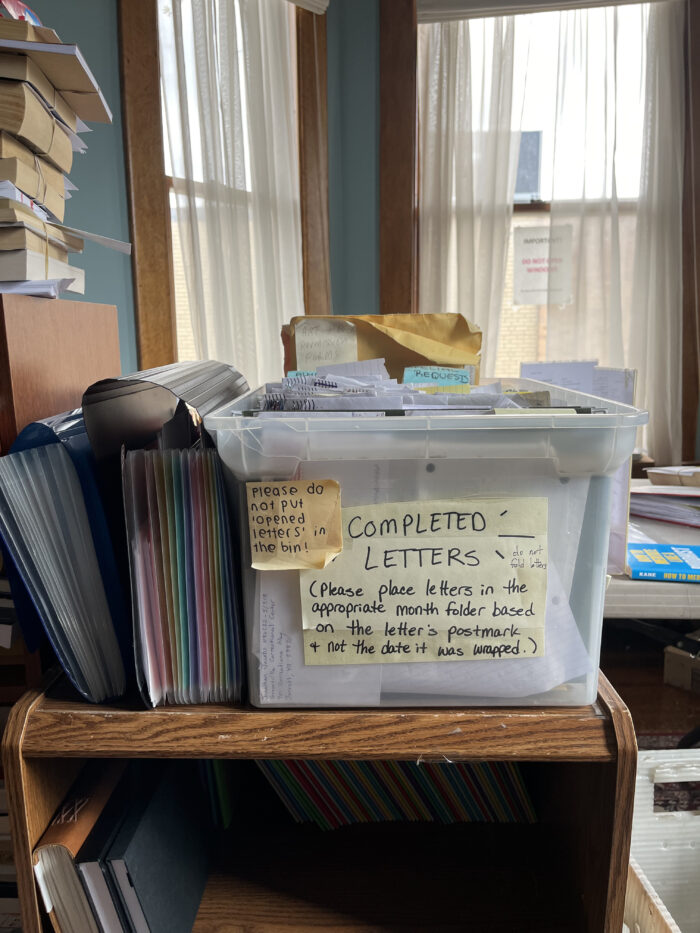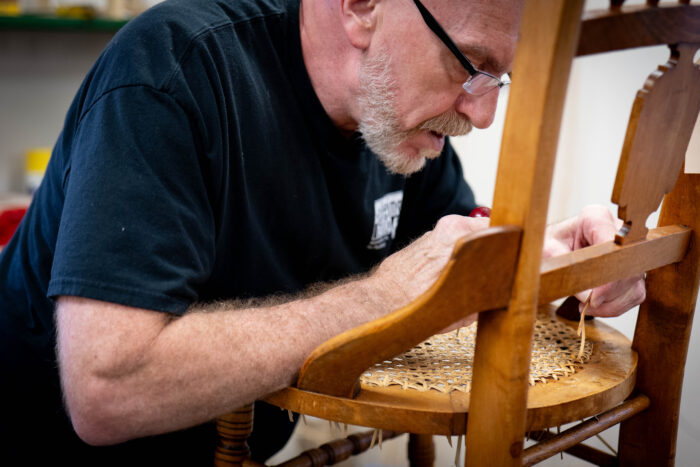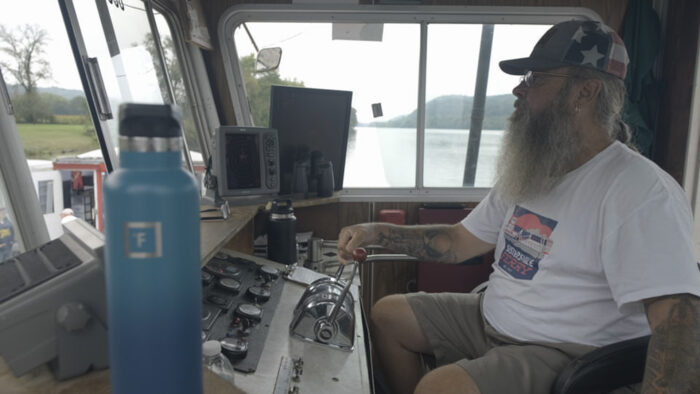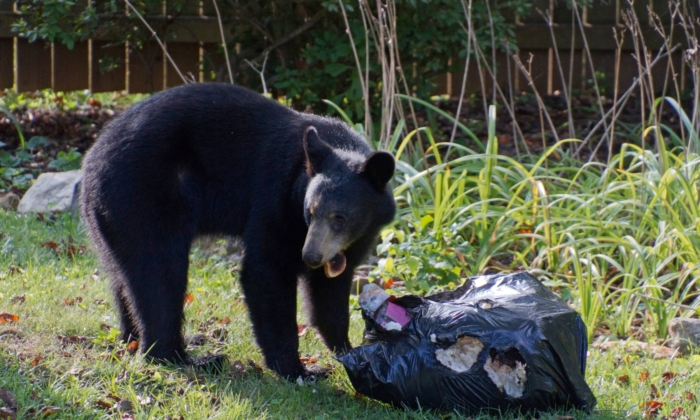Go offline with the Player FM app!
Appalachian Prison Book Project, Inside Appalachia
Manage episode 484453857 series 2471658
The Appalachian Prison Book Project has been sending books to incarcerated people for nearly 20 years. Its most popular book is the dictionary.
Also, the Seeing Hand Association brings together people who are visually impaired to learn the craft of chair caning.
And, crossing a river by ferry can be a special experience, and hard to come by. On the Ohio River, a retiring ferry captain passes the torch to his deck hand.
You'll hear these stories and more this week, Inside Appalachia.
In This Episode:
- The Appalachian Prison Book Project
- Seeing Hand Fixes More Than Chairs
- Raising Up A New Riverboat Captain
- Black Bears Eating Trash In West Virginia
The Appalachian Prison Book Project

Photo courtesy of the Appalachian Prison Book Project
Each year, Berea College and the Appalachian Studies Association present the Weatherford Awards. They honor books about the Appalachian South. The winner of the 2024 award for nonfiction is titled, This Book is Free and Yours to Keep. It consists largely of letters from incarcerated people across the region who corresponded with the Appalachian Prison Book Project.
Ellen Skirvin is one of the book’s editors. Host Mason Adams spoke with her about the project.
Seeing Hand Fixes More Than Chairs

Photo Credit: Clara Haizlett/West Virginia Public Broadcasting
In April of this year, Clara Haizlett placed first at the Virginias Associated Press Broadcasters Awards for Best Mountain State Heritage with a story about a community of people in Wheeling, West Virginia who repair old caned chairs. You know the type. Your parents or grandparents might’ve had a set. You don’t see caned chairs as much as you used to. Cane breaks down and few people know how to fix the chairs. So, they get thrown away. But they don’t have to be.
We listen to an encore of that story.
Raising Up A New Riverboat Captain

Photo Credit: Zack Harold/West Virginia Public Broadcasting
The town of Sistersville, West Virginia is home to the last ferry crossing in the Mountain State. The Sistersville Ferry has been serving this tiny community for more than 200 years, and now there’s a new pilot at the helm.
Late last year, before the ferry stopped running for the winter, Zack Harold stopped by to witness the last ride of Captain Bo Hause.
Black Bears Eating Trash In West Virginia

Courtesy of the Division of Natural Resources
People who live in cities can get used to having their trash picked up at the curb. But folks who live in more rural communities have to haul it to dumpster sites. Those sites are destinations not just for folks hauling trash, but also for bears, seeking an easy meal. Now, some places have made moves to keep the bears out of the trash, which also helps keep them alive.
WVPB’s Eric Douglas has more.
------
Our theme music is by Matt Jackfert. Other music this week was provided by Jeff Ellis, The Sycomores, Tim Bing, John Inghram, Paul Loomis and Blue Dot Sessions.
Bill Lynch is our producer. Abby Neff is our associate producer. Our executive producer is Eric Douglas. Kelley Libby is our editor. Our audio mixer is Patrick Stephens. We had help this week from Folkways Editor Chris Julin.
You can send us an email: [email protected].
You can find us on Instagram, Threads and X @InAppalachia. Or here on Facebook.
Sign-up for the Inside Appalachia Newsletter!
Inside Appalachia is a production of West Virginia Public Broadcasting.

108 episodes
Appalachian Prison Book Project, Inside Appalachia
Podcast - Inside Appalachia Story Archives - West Virginia Public Broadcasting
Manage episode 484453857 series 2471658
The Appalachian Prison Book Project has been sending books to incarcerated people for nearly 20 years. Its most popular book is the dictionary.
Also, the Seeing Hand Association brings together people who are visually impaired to learn the craft of chair caning.
And, crossing a river by ferry can be a special experience, and hard to come by. On the Ohio River, a retiring ferry captain passes the torch to his deck hand.
You'll hear these stories and more this week, Inside Appalachia.
In This Episode:
- The Appalachian Prison Book Project
- Seeing Hand Fixes More Than Chairs
- Raising Up A New Riverboat Captain
- Black Bears Eating Trash In West Virginia
The Appalachian Prison Book Project

Photo courtesy of the Appalachian Prison Book Project
Each year, Berea College and the Appalachian Studies Association present the Weatherford Awards. They honor books about the Appalachian South. The winner of the 2024 award for nonfiction is titled, This Book is Free and Yours to Keep. It consists largely of letters from incarcerated people across the region who corresponded with the Appalachian Prison Book Project.
Ellen Skirvin is one of the book’s editors. Host Mason Adams spoke with her about the project.
Seeing Hand Fixes More Than Chairs

Photo Credit: Clara Haizlett/West Virginia Public Broadcasting
In April of this year, Clara Haizlett placed first at the Virginias Associated Press Broadcasters Awards for Best Mountain State Heritage with a story about a community of people in Wheeling, West Virginia who repair old caned chairs. You know the type. Your parents or grandparents might’ve had a set. You don’t see caned chairs as much as you used to. Cane breaks down and few people know how to fix the chairs. So, they get thrown away. But they don’t have to be.
We listen to an encore of that story.
Raising Up A New Riverboat Captain

Photo Credit: Zack Harold/West Virginia Public Broadcasting
The town of Sistersville, West Virginia is home to the last ferry crossing in the Mountain State. The Sistersville Ferry has been serving this tiny community for more than 200 years, and now there’s a new pilot at the helm.
Late last year, before the ferry stopped running for the winter, Zack Harold stopped by to witness the last ride of Captain Bo Hause.
Black Bears Eating Trash In West Virginia

Courtesy of the Division of Natural Resources
People who live in cities can get used to having their trash picked up at the curb. But folks who live in more rural communities have to haul it to dumpster sites. Those sites are destinations not just for folks hauling trash, but also for bears, seeking an easy meal. Now, some places have made moves to keep the bears out of the trash, which also helps keep them alive.
WVPB’s Eric Douglas has more.
------
Our theme music is by Matt Jackfert. Other music this week was provided by Jeff Ellis, The Sycomores, Tim Bing, John Inghram, Paul Loomis and Blue Dot Sessions.
Bill Lynch is our producer. Abby Neff is our associate producer. Our executive producer is Eric Douglas. Kelley Libby is our editor. Our audio mixer is Patrick Stephens. We had help this week from Folkways Editor Chris Julin.
You can send us an email: [email protected].
You can find us on Instagram, Threads and X @InAppalachia. Or here on Facebook.
Sign-up for the Inside Appalachia Newsletter!
Inside Appalachia is a production of West Virginia Public Broadcasting.

108 episodes
Alle afleveringen
×Welcome to Player FM!
Player FM is scanning the web for high-quality podcasts for you to enjoy right now. It's the best podcast app and works on Android, iPhone, and the web. Signup to sync subscriptions across devices.



